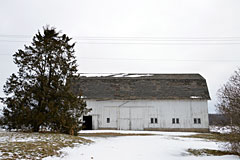
Timber-frame barn owned by Michigan State University. Lost
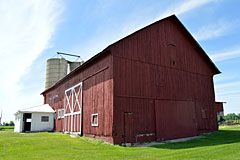
Dismantled with portions salvaged for an agri-tourism
venue. (Adaptive reuse codes are needed for the reuse of heritage barns to preserve more of them.)
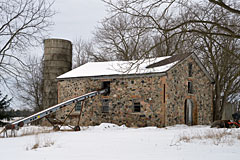
Rare 1853 stone barn. Failing.
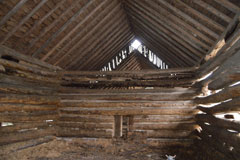
"Cut it up for firewood," an insurance
agent told the owner of this magnificent Upper Peninsula log barn.
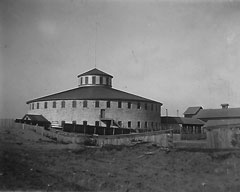
The exquisite brick round barn once stood
in Menominee County on a stock farm where there were also several other outbuildings including at least
two large timber-frame barns. Nothing remains of the farm today.
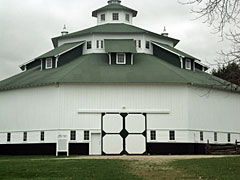
Contrast that with the Thumb Octagon Barn
in Gagetown, nearly destroyed, but rescued by a group of determined people who formed Friends of the Thumb
Octagon Barn. Today, it is a thriving center of activity and agricultural history.
Threats to barns:
- Assuming a barn is too expensive to maintain, is a liability, or cannot be adapted for a new use and allowing it to decay.
- Neglecting maintenance which makes repair costs rise and destroys potential. Protecting roofs, removing trees and vines, and stabilizing foundations are essential to longevity.
- Failing to compare tax savings from repairing and adapting, versus the tax/cost for new construction.
- Pressure from insurers, zoning officials, developers, builders, realtors, etc. to destroy barns for personal profit.
- Houses and barns split from land, limiting options for buyers.
- Destruction of historical documents and photos that should be archived and preserved.
- A shortage of people qualified to evaluate, repair, and adapt barns.
- Development without creative thinking that could incorporate heritage buildings into beneficial adaptive reuse.
- A critical need for cooperation and proactive leadership within the barn preservation community at the state and national level to work toward barn-supportive policies, education, loan and grant programs, focus groups, and training.
Barn Aid Series
The National Trust for Historic Preservation and Successful Farming Magazine
These booklets were first published as part of the National Trust for Historic Preservation’s BARN AGAIN! program (in collaboration with Successful Farming magazine) in the 1990s. Reproduced here in digital format with permission for free personal download, monetary calculations are no longer accurate, however the basics remain valuable. Other excellent barn repair reference materials available for download include Ohio State University Extension “Fact Sheets” on rehabilitation, economic incentives, and hiring a contractor. (www.ohioline.osu.edu)
Clicking on an image will download the PDF of the page.




